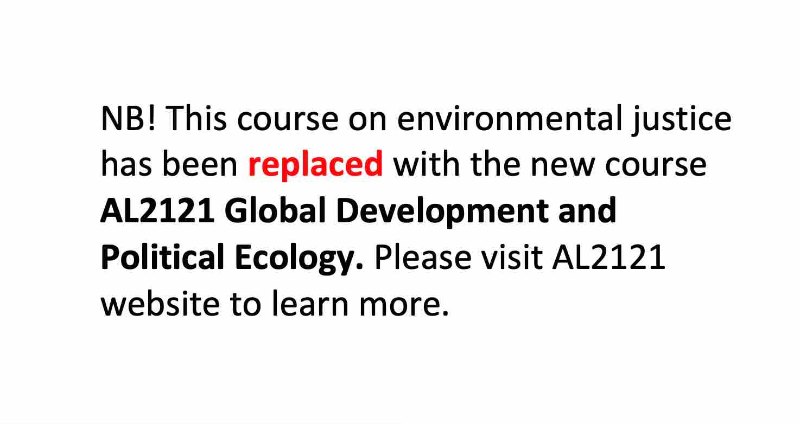The course focuses environmental justice regarding access to and use of ecological resources. In the course the ecological resource base that is needed to support urban structures together with a consumer intensive life style and also how natural resources and negative environmental impact are distributed between different groups in society is illustrated and discussed. During the course strategies for social-ecological just and including use of natural resources and potentials to promote environmental justice in planning and environmental technology are also discussed.
AL2503 Planning for Environmental Justice in Social-ecological Systems 7.5 credits
This course will be discontinued.
Decision to discontinue this course:
The course is discontinued from the spring semester 2027 as decided by the Faculty Board: HS-2025-0530. Decision date: 2025-06-12. The course was given for the last time in the autumn semester 2022. The last opportunity for examination in the course is the autumn semester 2026.

NB! This course on environmental justice has been replaced with the new course AL2121 Global Development and Political Ecology. Please visit AL2121 webpage to learn more and apply.
Information per course offering
Course offerings are missing for current or upcoming semesters.
Course syllabus as PDF
Please note: all information from the Course syllabus is available on this page in an accessible format.
Course syllabus AL2503 (Autumn 2025–)Content and learning outcomes
Course contents
Intended learning outcomes
After passing the course, the student should be able to:
- identify relevant issues and explain key concepts, theories and perspective within the scope of the focus area of the course; planning for environmental justice in social-ecological systems
- discuss and argue for and against different perspectives on environmental justice in social-ecological systems
- give suggestions on how urban planning/civil engineering and environmental technology can be developed to identify, handle and/or prevent injustices with respect to use of ecological resources.
- apply the perspective of the course on real cases and communicate the result of the analysis to relevant target group
Literature and preparations
Specific prerequisites
3 years of higher education in urban planning, regional planning, architecture, technology or social sciences. Documented knowledge in English B or the equivalent (TOEFL, IELTS e g).
Recommended prerequisites
Completed at least one of the following courses (or similar):
AG2805 Sustainable Planning and Design
AL2511 Resilience Thinking in Sustainable Planning
AG2142 Political Economy for Environmental Planners
Literature
Examination and completion
Grading scale
Examination
- SEM1 - Seminars, 1.0 credits, grading scale: P, F
- TEN1 - Home exam, 3.5 credits, grading scale: A, B, C, D, E, FX, F
- PRO1 - Project assignment, 3.0 credits, grading scale: A, B, C, D, E, FX, F
Based on recommendation from KTH’s coordinator for disabilities, the examiner will decide how to adapt an examination for students with documented disability.
The examiner may apply another examination format when re-examining individual students.
If the course is discontinued, students may request to be examined during the following two academic years.
Examiner
Ethical approach
- All members of a group are responsible for the group's work.
- In any assessment, every student shall honestly disclose any help received and sources used.
- In an oral assessment, every student shall be able to present and answer questions about the entire assignment and solution.